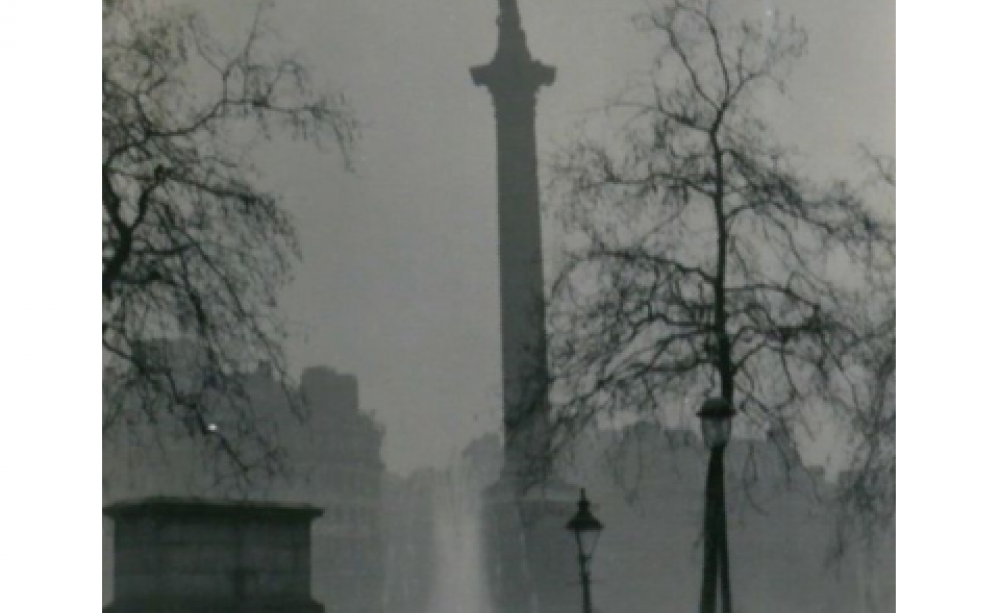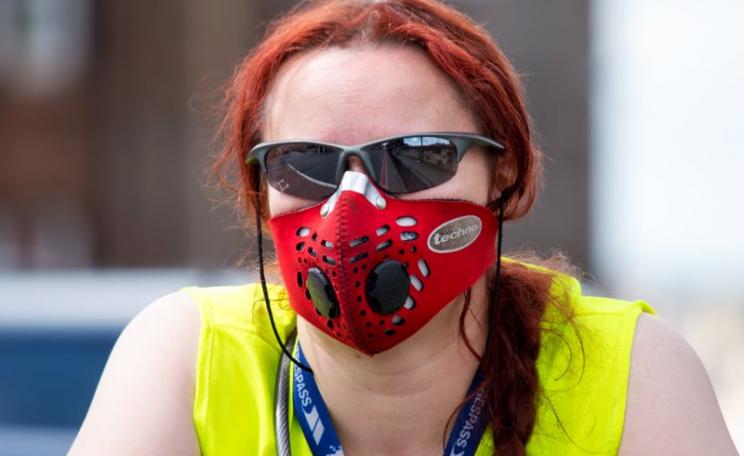We wouldn't let a child of four smoke a cigarette. But the Mayor of London subjects children everyday to similar risks by refusing to act over high pollution levels.
It feels like Spring has come - the evenings are longer, the sun is shining, the daffodils are flowering.
It would be so nice to enjoy the warm, sunny days and yet there is that annoying little tickle in the back of my throat, an occasional cough and sore eyes by the end of the day.
That's the effect of smog, which seems to accompany a pleasant warm day in London now as certainly as night follows day
You may have seen it as a haze settled over London and many other cities and towns. But many of the components of today's air pollution are invisible - not like in the days of the 'pea-soupers', caused by households, industry and power stations burning coal.
Silent but deadly
But the pollution is here all the same, mostly created by traffic - and just as deadly. As I write this pollution levels for Greater London are currently high and rated 9 on the DEFRA pollution index of which 10 is the worst.
And these smogs aren't just annoying. The facts are indisputable and stark - air pollution is killing us in our thousands.
There are two main components, particles and gases. Tiny particles, or particulate matter (PM), are mostly made up of diesel soot, brake and tyre wear.
These particles are classified by their diameter in microns e.g. PM2.5 and PM10. The World Health Organisation has not set a threshold level of safety for these particles. But just because there just isn't one, does not mean its OK to be breathing this material deep into our lungs.
Then there are gases. The main problem arises from nitrous dioxide (NO2). Toxic and irritant in itself, its concentrations also correlate with those of other toxic pollutants.
Air pollution causes heart attack and stroke
A study by the Mayor showed that 4,267 premature deaths occurred in London alone in just one year, 2008, due to long term exposure to fine particulate matter.
And it's not just respiratory health that suffers from air pollution. Most of the premature deaths were caused by heart attacks and strokes. This is because the fine particulates enter the blood stream through the lungs, and cause inflammation and other cardiovascular problems.
Last year the World Health Organisation classified air pollution as a grade 1 carcinogen with regard to lung cancer, and they also noted a positive association with an increased risk of bladder cancer.
Where's the outcry?
Children's health and development is affected too. Over 1,100 schools in London are within 150 metres of the city's busiest and most polluted roads - classed as those that carry over 10,000 vehicles a day. It is thought that this pollution is responsible for 15-30% of all new cases of asthma in children.
Air pollution is the second greatest public health risk in Britain, after smoking. It is a bigger cause of premature death than obesity and alcoholism. But where is the outcry? Politicians and media are mysteriously muted on this vital issue.
We wouldn't let a child of four smoke a cigarette. But the Mayor of London subjects children everyday to similar risks by refusing to act over high pollution levels.
We wouldn't let a child of four smoke a cigarette. But the Mayor of London subjects children everyday to similar risks by refusing to act over high pollution levels - while not even warning Londoners of the health dangers they face on a daily basis.
Paris is also facing high pollution levels - but there the authorities have acted. Just today Paris restricted cars in the city - from Monday any car will only be allowed to drive in the city on alternate days.
Last week they warned residents over high pollution levels, banned large lorries, began a police crack-down on drivers breaking newly lowered speed limits, pulled unnecessary municipal vehicles off the roads, and dropped charges for non-automobile public transport, including the Velib bike hire scheme.
And from the Mayor of London - nothing.
The EU to the rescue
The response of the Government, the Mayor and Local Authorities to this issue has been woeful. Fortunately the EU is now stepping in to the breach, as the European Commission plans Europe-wide action on air pollution.
The Commission has also launched legal proceedings against the UK for failing to reduce "excessive" levels of nitrogen dioxide (NO2) air pollution from traffic - and by failing to even submit a credible plan to do so.
It has sent the UK a 'Letter of Formal Notice' for breaching NO2 limit values in 16 of 43 zones. The UK is the first of the EU's 28 Member States to receive enforcement action on NO2. The estimated fine is £300 million per annum.
We know the solutions
Campaigners have been promoting the solutions for years. And yet the Mayor has chosen to concentrate on cheating the system - by spraying glue on roads near monitoring stations!
His big idea was to stick particulate pollution to the road surface and reduce the amount of particulate pollution rising high enough to be measured. Jenny Jones, a Green member of the London Assembly, told Boris that if this was his anti-pollution strategy he should at least spray glue on the roads around schools and nurseries. He didn't.
He did plant some shrubs alongside roads near the monitoring stations - hoping the pollution would stick to the foliage and reduce readings. But of course it did nothing to cut the actual pollution, or the traffic that's causing it.
In fact, he chose to encourage even more car journeys by removing the Congestion Charge Western Extension.
Action not cover-up
Meanwhile the Government has preferred to expend its energy on lobbying for the rules to be weakened, rather than protect the health of its citizens. There are many actions that can be taken that will not only improve our air quality but make London a much healthier and livable city.
London needs an ultra-low emission zone (ULEZ) and it needs to cover not just a small area of central London but all the boroughs with health damaging levels of air pollution.
European Structural Funds are available to help with the transition away from the older and most polluting diesel vehicles which must be banned from this zone along with the oldest petrol vehicles.
Berlin is at least five years ahead with its plans for such a zone and provides a model as to how these things can be done.
Low emission vehicles, slower speeds
All new buses must now be low emission hybrids, hydrogen or electric and current buses must be retrofitted to minimise air pollution emissions.
Taxi drivers must be given assistance to ensure they can access the most up to date vehicles and technology to minimise their contribution to air pollution.
20mph should be the default speed limit - and not just on residential streets, but on all streets where people live work and shop. Smoother traffic flow and making the roads safer and more attractive for pedestrians and cyclists will result in lower air pollution.
Promoting walking and cycling and making the experience safer, cleaner and more attractive is a key way to get people out of their cars.
Streets for people
We have to reduce the number of car journeys and stop treating our streets as a simple conduit to get the motor car as quickly as possible from A to B.
Our streets are the vessels of our communities and need to be reclaimed as such. They are where we live, work, shop - and where children should be able to play.
Our obsession with the car has to end - and with car ownership figures falling in London for years it seems residents are again ahead of the politicians.
Sadly road safety has been going backwards under the current Mayor and loud announcements on cycling budgets are rather like the infamous cycling superhighways - starting out bright and cheerful but often leading to a sudden dead end.
So there are plenty of things can be done and we have to hope that the pressure from the EU will start to lead to action. After all, we can't afford to spend £1 billion on fines every few years.
Standing up for people against traffic in Europe
When the UK has a Government, and London a Mayor with such laissez faire attitudes to public health it is vital that our MEPs in the European Parliament provide powerful, constructive voices to hold polluters to account and force positive change.
The smoke-laden fog that shrouded the capital from Friday 5th December to Tuesday 9th December 1952 led to strong action and an improvement in the health of millions of people - in particular those on low incomes who were then, as they are now, disproportionately affected by air pollution.
We don't have such a visual problem this spring, but the health impacts are just as bad. We have the solutions ready, solutions that will make London and other British cities much more livable. So why then aren't the Government and the Mayor seizing the opportunity?
We all deserve clean air - and right now it's only Europe that looks like makinig it happen. We must elect politicians who will defend our health, not seek to undermine the very measures put in place to protect it.
Caroline Allen is the Green Party's second-listed candidate for London in the European elections. A vet and community campaigner, she has lived in North and East London for the past decade, and has campaigned for local sports centres and green spaces, for safer streets and responsible pet ownership and against factory farming. Caroline is the Green Party's Spokesperson on animal issues and also has worked on science, food, animal and conservation policy.




